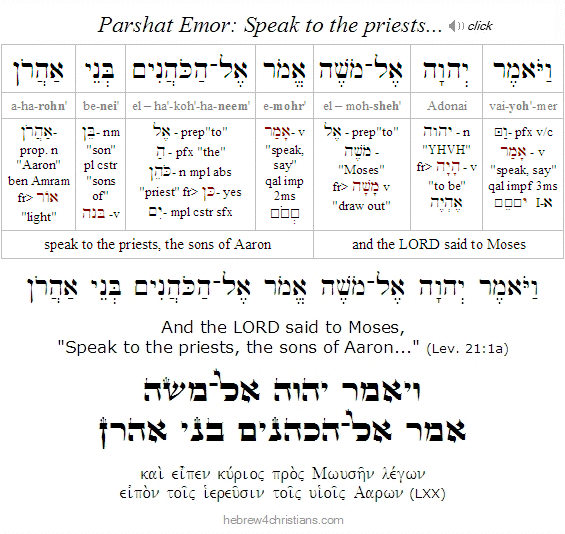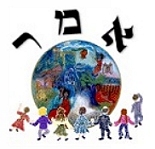|
Parashat Emor, which is always read during the Counting of the Omer, begins:
And the LORD said (וַיּאמֶר) to Moses, "Speak (אמר) to the priests, the sons of Aaron, and say (וְאָמַרְתָּ) to them..." (Lev. 21:1)
Some of the sages wondered why the same verb (אמר) is used three times in this opening verse. Rashi noted that the verb emor (אמר) has a softer tone than the verb dibber (speak, as in a command), suggesting almost a pleading quality: "Speak softly again and again..." Various explanations of this redundancy have been given, usually centering on educational philosophy and approach.
According to Samson Raphael Hirsch, the Hebrew word for "priest" (i.e., kohen: כּהֵן) is related to the Hebrew word kivun (כִּוּוּן) meaning "direction." In other words, God wanted the priests to function as role models for the rest of Israel. They were never intended to abrogate the responsibility of every Jew to walk in the commandments and serve God. True, the priests (and Levites) were called to be Torah teachers to Israel (Deut. 33:10), but their zeal was meant to inspire personal sanctity and the dissemination of chinukh (Torah learning) among the Jewish people (Lev. 22:32). The repetition of emor, then, suggests that Torah teachers shouldn't simply tell people what to do/believe, but rather should both tell and demonstrate Torah truth. When teaching, speak twice: once to explain the mitzvot (commandments), and a second time to ignite a passion to live according to the truth.... This applies especially to the priests, whose children were at times forced to act differently than their friends. It was the duty of the parents to teach life according to Torah, despite the pressure of the world to conform and assimilate.
The word chinukh (חִנּוּךְ), "education," shares the same root as the word "chanukah" (חֲנֻכָּה, dedication). Unlike the Greek view that regards education as a pragmatic process of improving one's personal power or happiness, the Jewish idea implies dedication/direction to God and His concrete purposes on the earth. Disciples of Yeshua are likewise called talmidim (תַּלְמִידִים), a word that comes from lamad (לָמַד) meaning "to learn" (the Hebrew word for teacher is melamad (מְלַמֵּד), a word that shares the same root). In the New Testament, the word "disciple" is μαθητής, a learner or a pupil of a διδάσκαλος, or a teacher. Education is foundational to being a disciple of the Messiah...
Following Yeshua, then, first of all means submitting to His authority and learning from Him (Matt. 23:8). Only after spending time with Him are you commissioned to go "to all the nations and teach..." (Matt. 28:19). This is accomplished not only by explaining doctrine but by kiddush HaShem -- sanctifying the LORD in our lives -- and living as a "living letter" sent into the world to be read (2 Cor. 3:2-3).... When asked for the reason of the hope that is in you, "speak softly again and again," in humility and grace (1 Pet. 3:15; Col. 4:6).
We are always speaking "twice," chaverim, and our children (and friends) know when we say one thing and do another. Knowing and doing the truth are intimately linked, since "faith without works is dead." The truth of Yeshua sets us free, but only if we live it in our lives. "Go into all the world and preach the gospel -- and sometimes use words."
 |
|



